- Oil Peak
- Posted
Oil and The Irish Economy

In terms of 1972 money, oil prices averaged about six dollars a barrel between 1987 and 2000. Last October they reached $40. They are now around $50 a barrel which means that they are beginning to climb back into the territory which caused the global economy to crash in 1979/80.
Economist Richard Douthwaite writes on the End of Oil and its impact on the Irish economy.
In April, the merchant bank Goldman Sachs warned that a ‘super-spike’ in oil prices might drive the cost of a barrel of crude up to $105, twice what they are at the time I’m writing this in early June. $105 would also be six times the average price between 1987 and 2000.
The bank referred to a ‘spike’ because prices could not stay at the $100 level for more than a few months without causing the collapse of the world economy. This would happen because we would all be spending so much more to buy our oil that we would be unable to carry on buying other things at the rate we do at present, particularly as the prices of other fuels would rise in step with that of oil.
As a result of the diversion of our spending, factories around the world would find they had spare capacity. They would lay off staff and cancel expansion projects and, as construction work is so energy intensive, its cessation would cause oil demand to fall rapidly. This is exactly what happened the last time its price went significantly above the $20 level in 1972 money. Millions of people would become unemployed and cut their spending to the bare minimum, causing other people to lose their jobs too. A global depression could develop in which the lack of activity in the world economy could cause the price of oil in today’s money to plummet from $100 back to around $15 a barrel again.
The cheap oil price would suit no-one because oil would be more expensive than ever for someone who had lost his or her job. Those people who still had the money to build or improve their houses or to run cars would see no reason to make them energy efficient and there would be no commercial incentive to explore for more oil or to develop renewable energy sources.

The oil producers would, of course, find the low prices ruinous. In the past the Saudis used to pump more oil whenever it was necessary to do so to keep prices from becoming excessive. This was to avoid a price spike developing and causing a global collapse. Unfortunately for the stability of the global economy, however, they don’t have the production capacity to do that any longer. They are already pumping as much oil as they can and their output is falling month by month because their oil fields are becoming exhausted.
No other country has enough unused capacity to pump much more oil than it is doing at present either so, if global demand continues to increase, prices can be expected to rise very sharply. A crisis could develop at the end of this year when world oil production of between 86 and 87 million barrels a day is expected to be some 2-4 million barrels less than the expected demand.
How quickly a world recession will set in after prices rise to the projected $100 is impossible to say. One unknown factor is how the world’s central banks would react to the widespread inflation that costly oil would undoubtedly bring. If central bankers try to cure the rising prices by pushing up interest rates to deter people from borrowing to spend, they would be removing money from the economies for which they were responsible at exactly the same time as those economies were haemorrhaging money to pay for their costly oil imports. In other words, if the central banks adopted their standard anti-inflationary strategy, they would give their economies a hefty shove into a global recession. The consequences for the construction sector would be dire.
I’ve been playing around with several oil price scenarios like this recently. Feasta, the NGO through which I do a lot of my work, was awarded a contract by the EPA earlier this year to get Irish businesspeople and public sector policymakers thinking about the effects that very much higher energy prices might have on how people live and make their livelihoods. We have developed four oil-price scenarios to do this and the one I’ve just described is one of them. We called it Enforced Localisation because the shortage of money, the collapse of the world market and the high unemployment leave people with no alternative but to start their own currency systems on the lines of those used in Argentina during the peso crisis and to develop their own local resources for local use. A computer model we are using which tracks energy rather than money flows in the Irish economy shows that life under this scenario becomes very tough indeed.
A much better out-turn is provided by the Fair Shares scenario. Like Enforced Localisation, it assumes that oil supplies cannot keep up with demand but imagines that the world handles the situation very differently. In times of war, when something vital like food gets scarce, no decent government allows the market to continue to distribute the scarce commodity by selling it all to the highest bidder. Instead, a rationing system is set up, with everyone getting coupons entitling them to an equal share of whatever is available. In Fair Shares, therefore, fossil energy is rationed on a global scale. Or, more accurately, the right to emit the carbon dioxide created by burning fossil fuel is shared out in a way which eventually brings the world’s annual rate of greenhouse gas emissions down to one which no longer causes global warming. Everyone on earth is issued annually with permits which entitle them to their individual emissions share. People can sell their permits and in the scenario, we imagine what effect this system of rationing would have on the world. Here’s one of our imaginings, a commentary written by someone in 2015:
Selling the permits gives everyone an income which compensates them, in whole or in part, for the extra cost of everything they buy due to the higher energy prices. Everyone sells their permits as soon as they get them and uses the money for their ordinary living. The extra money going to very poor people has created huge markets around the world for lots of simple products.
In addition, the high energy prices have given a huge boost not only to the switch to renewable energy but also to ways of living which use little energy. We, in Ireland, are poorer than we were because a lot of our money goes overseas to buy emissions permits. We can no longer afford to buy anything which we throw away when it breaks or becomes unfashionable. We are always looking for things which are easily repaired and will last. I never buy stuff not made in the EU because I need to be sure that the spares will be available when I need them. Lots of local authorities are relieved that they did not invest in incinerators a decade ago because there’s so little that’s burnable that’s being thrown away.
The demand from the poorer countries has created plenty of jobs in both manufacturing and in the farm sector, so there’s plenty of work, even if the money doesn’t go very far. I don’t have a car these days but I do have an electric bicycle which I charge up every night. There's very little house building going on - the costs are high because of the embodied energy, in spite of the general use of timber-frame. In any case, lots more houses than were needed were built in the early years of the century so we spend what money we can adapting them for our needs and getting them up to a decent energy standard. Houses with garages sell well because people use the space for workshops.
The other two scenarios are both based on the International Energy Agency’s belief that there is enough oil for the next 25 years. One, Business As Usual, delivers lots of economic growth for a few years but crashes disastrously when the world’s oil output eventually starts to decline. The other, Enlightened Transition, assumes that the Irish Government starts doing all the right things to get ready for the decline. As you might expect, this turns out very well. The only problem with this scenario is that, as resources are used to develop renewable energy supplies and, more generally, to construct an economy which requires almost no fossil energy to meet our needs, it grows more slowly and delivers smaller profits than the Business as Usual one. This could make it politically hard to introduce.
Feasta invited senior businesspeople, civil servants and politicians to explore all four scenarios with us at a day-long seminar in a Dublin hotel on June 1. About 45 accepted and thirty turned up. They put in such a hard day thinking about the implications of the different futures for Ireland that several people said at the end that their minds were whirling. “That’s no bad thing” one added. You can see the ideas we put to them, and some of their reactions, on a website we have set up for the project – www.energyscenariosireland.com . It’s a wiki, which means that you can help develop the material that’s there.
Feasta will be holding other seminars on the same lines and if anyone would like to attend one please e-mail me on This email address is being protected from spambots. You need JavaScript enabled to view it.. We hope that some of those who attend will want to join us afterwards in looking in greater detail at the response their sectors will have to make if energy prices go substantially higher than they currently are. We’ll be holding a conference and publishing a report about the changes they expect later in the year. They will join the effort because they will recognise that thinking out a proper strategy will stand their companies in good stead when the inevitable oil price rises come about.
- Articles
- Oil Peak
- Oil and The Irish Economy
- Peak
- Richard Douthwaite
- fossil fuels
- energy consumption
- crude oil prices
- Irish Economy
Related items
-
 Grant invests in biofuel tech for oil boilers
Grant invests in biofuel tech for oil boilers -
 Oil heating sector pivots to biofuels, but green groups raise concern
Oil heating sector pivots to biofuels, but green groups raise concern -
 Architects call for urgent climate action ahead of COP 26
Architects call for urgent climate action ahead of COP 26 -
 New research finds air pollution particles in human placentas
New research finds air pollution particles in human placentas -
 A brave new world: Oil and architecture
A brave new world: Oil and architecture -
 Passive house district uses one-third the heat of typical apartments — report
Passive house district uses one-third the heat of typical apartments — report -
 Material impacts
Material impacts -
Opinion
-
Thermal bridging
-
Isover awards
-
Carlow A1 upgrade
-
Zero waste


